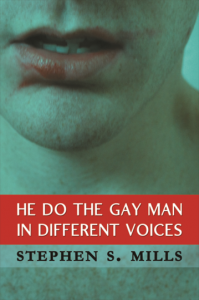“Fearless boys with glitter in their blood†from the poem “A History of Blood†perhaps best encapsulates the mindset that Mills takes in his first book of poetry.  This collection explores different facets of gay experience in the 21st century with a focus on sex and violence.
Mills consistently ties moments of personal importance with larger world events: for instance, a poem about fisting someone for the first time is tied to the day that “Don’t Ask, Don’t Tell†was repealed.
The poet rejects the notion that we should “…hide the good parts. The ‘dirty’ parts. A culture/obsessed with sex, yet so afraid of it.† This culture confronts that shame by unabashedly ignoring it, and the result is this fantastic collection.
The book is structured into three divisions, each part having a narrative running throughout it. Â The first section primarily details the memories, action, and sexual practices of the author with his longtime partner. Â Interspersed with these everyday occurrences, the poet returns to the ideas of tragedy through repeated references to a pair of boys hanged for sodomy in Iran and to gay bashings in the United States.
The second piece is composed entirely of the poem “An Experiment In How to Become Someone Else Who Isn’t Moving Anymore†which uses the life and crimes of Jeffrey Dahmer as a counterpoint to the speaker’s life.  The last is an extended sequence of poems that arose from Mills’ correspondence with Edmon Vardanyan (aka Nickolay Petrov), a gay porn star who was sentenced to prison in Louisiana for the assault of an elderly couple.
This third part is the weakest of three sections.  Although the story of the correspondence between Mills and Petrov unfolds in a narrative and interesting way, a few of the poems in this cycle (“September 21, 1991†and “Lines From a Prison Letterâ€) fall short of the emotional immediacy that characterizes much of the rest of the collection.
This book is a breath of fresh air and a competent first step for a poet who hopefully has a long career ahead of him. It is one that can be read again and again.
The collection is highly recommended for any library with an interest in gay and/or contemporary poetry. Â It should be noted that this collection contains explicit sexual imagery, but it is highly recommend to individuals who like boundaries pushed and literature unsanitized.
Reviewer: Mack Freeman

